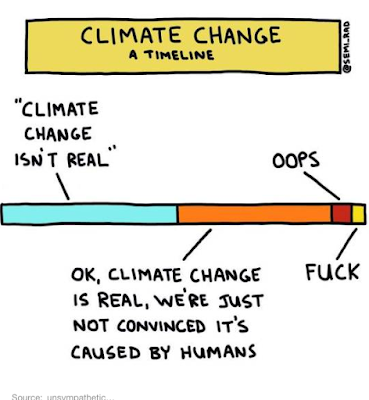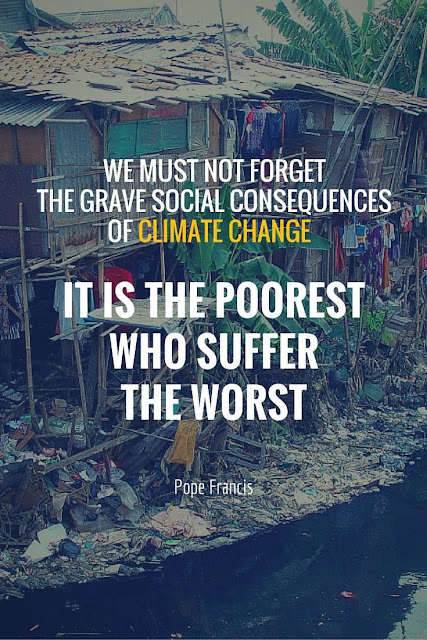Before the Covid-19 pandemic, climate change was the significant factor looming to ruin unprepared economies. Now that world economies are in deep depression it is 'green new deals' that can provide jobs in the future.
"The Climate Council’s report, ‘Compound Costs: How Climate Change is Damaging Australia’s Economy’, finds there are few forces affecting the Australian economy that can match the scale, persistence and systemic risk associated with climate change."
"As the Deputy Governor of the Reserve Bank of Australia noted, the risks that climate change poses to the Australian economy are “ first order” and have knock-on implications for macroeconomic policy (Debelle 2019)."
https://www.climatecouncil.org.au/resources/compound-costs-how-climate-change-damages-australias-economy/
• Increasing resilience to extreme weather and climate change should become a key component of urban planning, infrastructure design and building standards.
• Buildings and infrastructure must be built to withstand future climate hazards and to facilitate the transition to a net zero emissions economy.
• A credible national climate policy is needed to safeguard our economy by reducing the direct costs of climate change, and avoiding economic risks associated with a sudden, disruptive or disorderly transition to net zero emissions. " https://www.climatecouncil.org.au/resources/compound-costs-how-climate-change-damages-australias-economy/

• Some Australians will be acutely and catastrophically affected. Low-lying properties near rivers and coastlines are particularly at risk, with flood risks increasing progressively and coastal inundation risks emerging as a major threat around 2050.
• Certain events which are likely to become more common because of climate change are not covered by commercial insurance, including coastal inundation and erosion.
 Rewiring America says: "This real–world experience (WW3) illustrates the employment potential of a rapid transition to a clean energy economy. Probably the only viable project of the scale necessary to reignite economic growth and return to full employment is decarbonizing America’s energy system.This is equally true in many other countries in the world." Rewiring America
Rewiring America says: "This real–world experience (WW3) illustrates the employment potential of a rapid transition to a clean energy economy. Probably the only viable project of the scale necessary to reignite economic growth and return to full employment is decarbonizing America’s energy system.This is equally true in many other countries in the world." Rewiring America
It takes more people to install and keep a wind farm running than it does to drill a well and keep it pumping for the same amount of energy overtime. Renewables get their fuels for free, whereas fossil fuels cost money. It takes more labor and maintenance to access those free renewable fuels. This is a very desirable trade off in an economy with massive unemployment."
Rewiring America
 |
| When investors start to take notice of 'climate change'. |
"The Climate Council’s report, ‘Compound Costs: How Climate Change is Damaging Australia’s Economy’, finds there are few forces affecting the Australian economy that can match the scale, persistence and systemic risk associated with climate change."
"As the Deputy Governor of the Reserve Bank of Australia noted, the risks that climate change poses to the Australian economy are “ first order” and have knock-on implications for macroeconomic policy (Debelle 2019)."
https://www.climatecouncil.org.au/resources/compound-costs-how-climate-change-damages-australias-economy/
 |
| Climate Change is Real but Time is Running Out |
"5. The severe costs of climate change outlined in this report are not inevitable. To avoid the costs of climate change increasing exponentially, greenhouse gas emissions must decline to net zero emissions before 2050. Investments in resilience and adaptation will be essential to reduce or prevent losses in the coming decades.
• Increasing resilience to extreme weather and climate change should become a key component of urban planning, infrastructure design and building standards.
• Buildings and infrastructure must be built to withstand future climate hazards and to facilitate the transition to a net zero emissions economy.
• A credible national climate policy is needed to safeguard our economy by reducing the direct costs of climate change, and avoiding economic risks associated with a sudden, disruptive or disorderly transition to net zero emissions. " https://www.climatecouncil.org.au/resources/compound-costs-how-climate-change-damages-australias-economy/

"3. The property market is expected to lose $571 billion in value by 2030 due to climate change and extreme weather, and will continue to lose value in the coming decades if emissions remain high.
• One in every 19 property owners face the prospect of insurance premiums that will be effectively unaffordable by 2030 (costing 1% or more of the property value per year).• Some Australians will be acutely and catastrophically affected. Low-lying properties near rivers and coastlines are particularly at risk, with flood risks increasing progressively and coastal inundation risks emerging as a major threat around 2050.
• Certain events which are likely to become more common because of climate change are not covered by commercial insurance, including coastal inundation and erosion.
• More than $226 billion in commercial, industrial, road, rail, and
residential assets will be at risk from sea level rise alone by 2100, if
greenhouse gas emissions continue at high levels. "
https://www.climatecouncil.org.au/resources/compound-costs-how-climate-change-damages-australias-economy
https://www.climatecouncil.org.au/resources/compound-costs-how-climate-change-damages-australias-economy
"Extreme events like droughts, heatwaves, cyclones and floods have an impact on agriculture and food production; this is already affecting Australia’s economy and will cost us much more in the future."
https://www.climatecouncil.org.au/resources/compound-costs-how-climate-change-damages-australias-economy
“We will pay for climate breakdown one way or another, so it makes
sense to spend the money now to reduce emissions rather than wait until
later to pay a lot more for the consequences… It’s a cliché, but it’s
true: An ounce of prevention is worth a pound of cure.”
Nobel Prize-winning economist Joseph Stiglitz, a professor at Columbia University
 |
| Climate Change will affect the poor the most. |
Related: Prepare for more severe storms
 Rewiring America says: "This real–world experience (WW3) illustrates the employment potential of a rapid transition to a clean energy economy. Probably the only viable project of the scale necessary to reignite economic growth and return to full employment is decarbonizing America’s energy system.This is equally true in many other countries in the world." Rewiring America
Rewiring America says: "This real–world experience (WW3) illustrates the employment potential of a rapid transition to a clean energy economy. Probably the only viable project of the scale necessary to reignite economic growth and return to full employment is decarbonizing America’s energy system.This is equally true in many other countries in the world." Rewiring America
"Increasing employment under the transition to a zero–carbon is driven by the requirement for more labor in manufacturing, installation, and maintenance of renewables than their counterpart fossil fuel technologies.
It takes more people to install and keep a wind farm running than it does to drill a well and keep it pumping for the same amount of energy overtime. Renewables get their fuels for free, whereas fossil fuels cost money. It takes more labor and maintenance to access those free renewable fuels. This is a very desirable trade off in an economy with massive unemployment."
Rewiring America
 |
The Guardian |
Related: Seizing the moment: how Australia can build a green economy from the Covid-19 wreckage : The Guardian (excerpt)
Related: Is your local government body climate change ready?
#jailclimatecriminals #gaolclimatecriminals #climatescience #economy
#Australia, #cambio-climatico, #climateaction, #economy, #criminalesclimáticosdelacárcel, #fossilfuelcompanies, #greennewdeal,


No comments:
Post a Comment